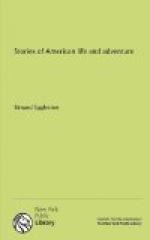Before the Revolution, when gentlemen called at fine houses in the afternoon, the ladies always gave them tea to drink. As soon as a gentleman’s little cup was empty, one of the ladies would fill it up again, and it was not polite to refuse to drink all the tea that was offered. A French prince who was in Philadelphia during the Revolution drank twelve little cups of tea one afternoon. The ladies kept giving him more, and the poor prince did not know how to stop them until another French gentleman told him privately that if he would lay his teaspoon across the top of the cup no more tea would be poured in. He put the teaspoon across the teacup as a sign that he did not wish to drink any more.
[Illustration: A Colonial Tea Party.]
Long after tea and coffee were in use in this country they were not known in the backwoods. The people on the frontier drank tea made from the root of the sassafras tree or from the leaves of some wild vines. The whole work of preparing food was done at home. When they wanted to grind meal, they did it by pounding corn in a hole cut in the stump of a tree. They used a large stone pounder which was tied by a rope to a limb of a tree above. After each blow the limb would spring back and raise the pounder. Their corn meal was sifted through a sieve made of deerskin with little holes punched through it. They had to make their shoes and hats and caps themselves, and to weave their cloth at home.
A boy who lived on the west side of the Alleghany Mountains in those days afterward wrote a book telling all about this rough life. His name was Joseph Doddridge. He spent his boyhood in a log cabin, in constant danger from Indians. The settlers had built a fort in the middle of the settlement. Sometimes in the night Joseph would hear a man tapping gently on the back window of his father’s cabin. As soon as anybody waked up, the man would whisper, “Indians!” Joseph’s father would then take down his gun. The children would be dressed in the dark as quickly as possible. Such things as would be needed in the fort were then picked up. Not a word was spoken, nor was any candle lighted. Even the little children learned to be perfectly silent, and the dogs were taught not to bark. When all was ready, the family would hurry away along the foot path to the fort. All the other families in the settlement would be called in the same way.
Every fall these settlers sent pack horses over the mountains. The horses were loaded with the skins of animals. When they came back, they carried salt, which was the one thing that could not be made in the settlement. But the men never thought it worth while to bring home with them tea and coffee or other unnecessary things.




